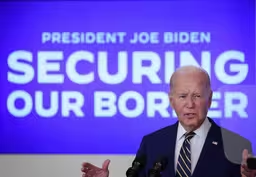
FDA rejects attempt to use MDMA for PTSD treatment
Clip: 6/4/2024 | 8m 47sVideo has Closed Captions
FDA panel rejects attempt to use psychedelic drug for PTSD treatment
A key FDA advisory committee rejected the use of a psychedelic drug to help patients struggling with PTSD, questioning its safety and effectiveness. The FDA must now decide whether it will follow suit and reject the use of what's known as MDMA. Some patients and researchers had long hoped the government would approve it. Science correspondent Miles O’Brien reports.
Problems playing video? | Closed Captioning Feedback
Problems playing video? | Closed Captioning Feedback
Major corporate funding for the PBS News Hour is provided by BDO, BNSF, Consumer Cellular, American Cruise Lines, and Raymond James. Funding for the PBS NewsHour Weekend is provided by...

FDA rejects attempt to use MDMA for PTSD treatment
Clip: 6/4/2024 | 8m 47sVideo has Closed Captions
A key FDA advisory committee rejected the use of a psychedelic drug to help patients struggling with PTSD, questioning its safety and effectiveness. The FDA must now decide whether it will follow suit and reject the use of what's known as MDMA. Some patients and researchers had long hoped the government would approve it. Science correspondent Miles O’Brien reports.
Problems playing video? | Closed Captioning Feedback
How to Watch PBS News Hour
PBS News Hour is available to stream on pbs.org and the free PBS App, available on iPhone, Apple TV, Android TV, Android smartphones, Amazon Fire TV, Amazon Fire Tablet, Roku, Samsung Smart TV, and Vizio.
Providing Support for PBS.org
Learn Moreabout PBS online sponsorshipGEOFF BENNETT: A key FDA advisory committee today rejected the use of a psychedelic drug to help patients struggling with post-traumatic stress disorder, questioning the trials and its effectiveness.
The FDA must now decide whether it will follow suit and reject the use of what's known as MDMA.
Some patients and researchers had long hoped the government would approve it.
Our science correspondent, Miles O'Brien, covered this day-long hearing and he joins us now.
So, Miles, why did the committee reject it?
There had been so much interest around this drug.
MILES O'BRIEN: Geoff, it's a complicated one for the FDA, because we're not talking just about a drug.
We're talking about a treatment regime that involves the drug, plus a very elaborate set of psychotherapy.
And the FDA, interestingly, does not regulate psychotherapy.
In addition, the psychotherapy, which was part of this study, was not standardized.
The study also had a very fundamental problem, which is to say, it could not be properly blinded.
Those who receive MDMA, ecstasy (AUDIO GAP) sugar pill, you know you didn't.
And so it was very difficult to get really objective results, because the psychological factor of knowing that you have had it favors a favorable outcome -- or a favorable response, I should say.
And, in addition to that, the company overlooked problems, or so the committee determined, overlooked problems in its pursuit of approval of this drug.
It really was a surprising decision, particularly given what we have heard over the years from many of the subjects who have described this drug and this therapy as a life-changing experience.
C.J.
Hardin is a former Army helicopter mechanic and machine gunner who faced imminent death in Iraq and also after he got home.
SGT.
C.J.
HARDIN (RET.
), U.S. Army: I didn't trust myself having a weapon around me, because I was suicidal, very suicidal, at that point.
MILES O'BRIEN: Years of pills and talk therapy failed to help his post-traumatic stress disorder.
So he turned to a surprising alternative at the center of a revolution in neuroscience.
DR. MICHAEL MITHOEFER, MDMA Therapy Researcher: This is the MDMA that we use for the current study.
MILES O'BRIEN: Hardin took MDMA, more commonly known as ecstasy, under the watchful eyes of therapists Annie and Michael Mithoefer, a husband-and-wife team based in Charleston, South Carolina.
DR. MICHAEL MITHOEFER: This is where we do the MDMA sessions.
MILES O'BRIEN: In studies that the Food and Drug Administration is now evaluating, two-thirds of patients reported significant improvement after carefully guided sessions like this.
SGT.
C.J.
HARDIN (RET.
): Which I knew it was the PTSD.
I was never feeling comfortable at home.
I was still lucid, but it just felt like I had opened up a new avenue of thinking.
MILES O'BRIEN: C.J.
Hardin says the difference for him was like night and day.
SGT.
C.J.
HARDIN (RET.
): I would have said a 60 percent reduction in my symptoms immediately.
I felt a mighty change had occurred.
MILES O'BRIEN: Stories like this have triggered a sea change in thinking about psychedelic drugs.
But the doctor who started the MDMA research program cautions, it takes more than a pill.
Patients must go through dozens of hours of intense, often painful therapy.
DR. MICHAEL MITHOEFER: This seems to be a very powerful tool, but it is only a tool.
And it's the person's own healing process and the relationships, the therapeutic relationships that support that, that are very important.
I think there is the danger of people thinking of it as a magic bullet.
MILES O'BRIEN: But there are skeptics opposing the treatment.
They say the MDMA studies are too small and not controlled enough to draw a firm conclusion.
They say that Lykos, the company running the trials and which would sell an approved drug, was focused on pushing through the treatment no matter what and that some of the therapists downplayed cases where vulnerable patients actually got worse.
GEOFF BENNETT: And, Miles, we heard the doctor in your piece there say that there's danger in thinking about this drug as being a magic bullet.
Expand on that.
Help us understand some of the concerns that came to the fore today and why the committee ultimately rejected it.
MILES O'BRIEN: Well, the committee, in the end, Geoff, just simply couldn't trust the results of these studies.
It was a relatively small group that was exposed to the MDMA and the psychotherapy that went along with it.
And there were other flaws that were part of it, so-called confounding factors.
In the end, it was a 9-2, a very dramatic vote, that the MDMA, along with the psychotherapy, was not proven to be effective.
They were also concerned that there weren't adequate safety measures taken.
As a matter of fact, they voted 10-1 that the safety measures were not enough.
There are things, detailed things, like they didn't take proper vital signs and lab work.
And then the real issue which kept coming up was the idea that patients in these scenarios, people undergoing therapy on MDMA, are extremely vulnerable.
And there was a lot of concern that they might be subject to risk in this setting.
GEOFF BENNETT: There was a public comment today that I'm told was pretty lively.
Did that have a role in shifting things here?
MILES O'BRIEN: I think so, Geoff.
There were three dozen individuals who participated in this virtually.
And it was like a parallel universe.
It was a tale of two cities.
On the one hand, we heard these emotional harrowing tales of individuals like C.J., who were on the brink of suicide and facing other maladies as a result of PTSD, which could not be solved by traditional talk therapy and drugs.
And then, on the other hand, individuals who had really strong critique of the company Lykos, which is behind all of this, a company they said that was hell-bent on getting this approved, almost had a cultlike -- that term cult came up many times -- and that cultlike approach to the treatment, and that one woman, in fact, separate from Lykos, but was abused by one of her therapists, spoke through a spokesman in order to maintain her anonymity.
And she felt that the company did not respond properly to the abuse she received during therapy.
The company claims it did, however.
So there were a lot of factors in play.
GEOFF BENNETT: A question about C.J.
Hardin, the veteran you profiled in your piece there.
Can he and other veterans who are using this treatment successfully, can they continue to use it even if this committee has rejected it?
MILES O'BRIEN: Well, no.
Ultimately, this has to be approved if you want to use it in a therapeutic setting.
But the interesting thing about C.J.
and so many of the individuals that we have spoken to is, he's fine, Geoff.
He went through the treatment and he, at this point, doesn't need to go back.
And that's the remarkable thing about what we have been hearing about MDMA.
Now, while the committee has said the proof is not there, the anecdotal comments and the anecdotal stories of people like C.J.
are quite profound.
GEOFF BENNETT: So what are the next steps here?
The advisory committee rejects it.
Does the FDA follow suit?
MILES O'BRIEN: It doesn't have to.
The FDA still has to make a final decision.
This will come on about August 11.
There was a recent analysis done of what -- how this goes, shakes out; 88 percent of the time the FDA does, in fact, follow its advisory committee.
They tend, when they reject what the advisory committee says, to bias toward approval.
And what's interesting about this one is, there's a lot of congressional support here.
This affects veterans.
And it's a bipartisan issue.
Republicans and Democrats have been sending -- pressuring and sending letters to the Veterans Administration encouraging it to do what it can to further these studies.
I mean, this is -- it's a frustrating thing.
PTSD affects 13 million Americans.
And there aren't a lot of tools in the toolbox.
GEOFF BENNETT: Yes.
Miles O'Brien, thanks so much for walking us through this important story.
We appreciate it.
MILES O'BRIEN: You're welcome, Geoff.
Biden order restricts how many migrants can seek asylum
Video has Closed Captions
Clip: 6/4/2024 | 5m 26s | Biden order restricts how many migrants can seek asylum at southern border (5m 26s)
Modi reelected but party losses could affect his 3rd term
Video has Closed Captions
Clip: 6/4/2024 | 3m 40s | Modi wins 3rd term as India's prime minister, but party losses could affect how he governs (3m 40s)
Sen. Kelly on supporting Biden’s plan to limit asylum
Video has Closed Captions
Clip: 6/4/2024 | 7m 40s | Sen. Mark Kelly explains why he supports Biden's plan to limit who can seek asylum (7m 40s)
Some universities return to standardized tests in admissions
Video has Closed Captions
Clip: 6/4/2024 | 9m 13s | Why some universities are returning to standardized testing in admissions process (9m 13s)
Providing Support for PBS.org
Learn Moreabout PBS online sponsorshipSupport for PBS provided by:
Major corporate funding for the PBS News Hour is provided by BDO, BNSF, Consumer Cellular, American Cruise Lines, and Raymond James. Funding for the PBS NewsHour Weekend is provided by...














